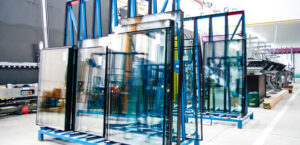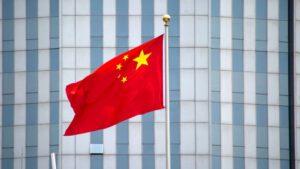
The National Agency for the Prevention of Corruption (NAPC) has included Turkish Şişecam Group, which is the largest exporter in the Russian Federation in its industry, in the list of international sponsors of war, the press service of the NAPC reports.
The main areas of activity of the company are glass and chemical production. Şişecam Group is the world’s second largest producer of glassware, the fifth largest producer of glass containers and sheet glass, and a world leader in the production of soda ash and chromium-based chemicals.
Şişecam’s 2022 revenue increased to $3.6 billion and net profit to $740 million.
Since the start of Russian aggression in 2014, Sisecam Flat Glass has been producing architectural, construction and automotive glass in Russia at the Alabuga SEZ in the Republic of Tatarstan. In Russia, Şişecam’s consolidated production volumes of flat glass, glassware and glassware exceed 1.5 million tons per year, with total investments of $1.25 billion. The company provides jobs for 3,414 employees at its plants in Russia, thereby creating jobs and supporting the terrorist state’s economy.
In particular, Şişecam Group’s subsidiaries producing sheet glass, glassware and glass containers paid more than $11.2 million in taxes to the Russian Federation in 2022.
The NAPC release notes that there was no attempt to condemn Russia’s war against Ukraine from the company’s management.
Şişecam Group has two assets in Ukraine – Pivdenna Brewery LLC and Merefianska Sklana Kompaniya.

In Ukraine from April 1, 2022 to April 1, 2023, 203.921 thousand FOPs were closed, while at the same time 208.936 thousand new FOPs and more than 32 thousand companies were registered, according to analytical materials “Opendatabot.”
“Despite full-scale hostilities and blackouts, business in Ukraine continues to grow. At the beginning of April 2023, the total number of registered FPOs amounted to 1.9 million, companies – more than 1.2 million,” – reported in the review.
It is reminded that from the beginning of full-scale war and almost till the end of March, the Unified State Register did not work, therefore it was impossible to register a new business or to close an existing one in the legal field. All data refers to the period from April 1, 2022 to April 1, 2023.
As noted, the military year was not a record for the closure of businesses: at the beginning of April 2023, 203.921 thousand FOPs were closed, while in previous years in Ukraine on average 260 thousand FOPs were closed per year.
At the same time, during the analyzed period – from April 1, 2022 to April 1, 2023 – 208.936 thousand new FOPs were registered.
As the analysts of “Opendatabot” note, in contrast to small and medium-sized businesses, the number of new companies significantly exceeded the number of closed ones. More than 32,000 companies were registered during the war, while 5,728 businesses ceased operations and became inactive.

China unveiled a 12-point peace plan Friday to end the Ukraine-Russia war.
The document, posted on the Foreign Ministry’s website, lists the first point as “respect for the sovereignty of all countries.” “The universally recognized norms of international law, including the purposes and principles of the United Nations Charter, must be strictly observed. The sovereignty, independence and territorial integrity of all countries must be effectively protected,” the text reads.
“A rejection of the Cold War mentality. The security of a country should not be secured at the expense of others. The security of the region should not be ensured by the strengthening or expansion of military blocs,” the 2nd paragraph notes.
Among China’s other proposals is a cessation of hostilities. “All sides should support Russia and Ukraine to work in the same direction and resume direct dialogue as soon as possible in order to gradually de-escalate the situation and eventually reach a comprehensive ceasefire,” it says.
China also proposes resolving the humanitarian crisis, protecting civilians and prisoners of war (POWs), securing nuclear power plants, reducing strategic risks (no nuclear weapons and no nuclear wars), promoting grain exports, ending unilateral sanctions, maintaining the stability of production and supply chains, and promoting post-conflict reconstruction.
The Embassy of the People’s Republic of China in Kyiv specified to Interfax-Ukraine that the document was based on the “four necessities” proposed by President Xi Jinping; the “four common positions” to be followed by the international community; and the “Three Observations” on the crisis.
As the embassy explained, the “four necessities” are that the sovereignty and territorial integrity of all states should be respected, the purposes and principles of the UN Charter should be observed, the rational security concerns of all countries should be taken seriously, and all efforts contributing to a peaceful resolution of the crisis should be supported.”
“The four ‘common positions’ to be followed by the international community imply that the international community should support all efforts contributing to a peaceful resolution of the crisis in Ukraine and call on the parties concerned to remain prudent, exercise restraint, and establish direct contacts as soon as possible and create conditions for renewed negotiations; together oppose the use or threat of use of nuclear weapons, advocate the unacceptability of nuclear weapons and the conduct of nuclear war
“Three observations” on the crisis – “There are no winners in conflicts and wars,” “Complex problems have no simple solutions,” “Confrontations between great nations must be avoided
Meanwhile, on Thursday, the UN General Assembly voted in favor of the resolution “Principles of the United Nations Charter underlying the achievement of a comprehensive, just and lasting peace in Ukraine,” a draft of which was submitted by 57 countries, including Ukraine.
According to the resolution, the General Assembly “reiterates its demand that the Russian Federation immediately, fully and unconditionally withdraw all of its armed forces from the territory of Ukraine within its internationally recognized borders, and calls for a cessation of hostilities.
The resolution also calls for “the immediate cessation of attacks on Ukraine’s critical infrastructure and any deliberate targeting of civilian objects, including homes, schools and hospitals.
China abstained from voting for the resolution.

A drop in sales of more than 30% due to Russian aggression was experienced by 47% of Ukrainian companies, including 19% with a drop exceeding 50%, agriculture, retail, mining and metals industries suffered the most, these are the results of a new business resilience survey presented by the American Chamber of Commerce (AmCham).
“The war has taken a huge toll on Ukrainian businesses, but companies have shown extraordinary resilience and some have even found opportunities for growth,” the report said.
According to a study conducted jointly with McKinsey & Company Ukraine on the eve of the first anniversary of the war, in 2022, 3% of companies increased sales, while 10% either maintained them or kept the decline within 10%. Opportunities for growth were noted by representatives of the banking and financial sectors and IT.
Only 4% reduced the number of employees by more than 30%, while 29% of the companies had the figure in the 10-30% range and 2% even increased the number of staff.
It is indicated that 4% of companies have stopped operations and do not know when they can resume them, while 30% stopped, but have already resumed.
According to respondents, in 2023 the pressure of war on business will remain or even increase. Also among the discouraging forecasts is the reduction of aggregate demand, as GDP growth remains uncertain and the purchasing power of consumers may decline due to depletion of savings, rising unemployment and reduced wages.
As stated in the survey results, 90% of companies have developed internal “contingency plans,” but more than 40% of respondents believe they are not effective enough.
As part of these plans, 61% created pre-war special task forces (multifunctional teams or with a specialization in the risk management function), 33% developed such plans with business units, and 6% enlisted professional outside help to prepare plans. Also, 40% of companies admitted the plan did not work as expected, including 29% who did not foresee the extent of failure and 7% who did not have the necessary resources to implement the plan.
According to the published information, the main military challenge for 25% of respondents was decrease in demand for products or services (60% in machine building, 42% in retail), for 23% – physical damage to facilities (67% in FMCG, 50% in transport/machinery), 19% – disruption of supply chains (pharma – 50%, machine building – 40%).
The problem of energy supply was named as the main problem by 10% of respondents (IT – 30%, banks – 25%), but among the top three problems it is in the lead with 66%, ahead of supply chain disruption 60% and reduced demand 52%.
Among the key priorities for effective contingency planning, companies highlighted an agile operating model and a strong corporate culture.
“While an agile operating model is seen as the most useful factor for overcoming the ongoing crisis, among the priorities companies see for their future development, respondents cited diversification, better contingency planning and building resilient teams,” the survey noted.
In the future to overcome the crisis 46% of companies will pay attention to the strategy and diversification of business, which requires rethinking investment plans, 29% more effectively plan their actions, 18% will attract and maintain a sustainable team and workforce.
The American Chamber of Commerce in Ukraine is the most influential international business association serving over 600 member companies in Ukraine since 1992, bringing the united voice of American, international and Ukrainian companies that have invested over $50 billion in Ukraine and remain committed to the country.

ArcelorMittal remains committed to Ukraine and believes in its future, despite the huge difficulties in the work of its own mining and smelting plant, ArcelorMittal Krivoy Rog (AMKR), caused by full-scale armed aggression of Russia, said Vijay Goyal, ArcelorMittal executive vice president and CEO of ArcelorMittal CIS.
“Every day we lose more than $1 million. 10% of our staff is at war, 67 people died defending the country… But I not only hope, but I believe that we will come out victorious. We are willing, able and ready to rebuild,” he said at a business forum on the rapid reconstruction of Ukraine in Luxembourg organized by the Ukrainian-Luxembourg Business Club.
ArcelorMittal board member Michel Wurth noted that since buying Krivorozhstal in a privatization tender in 2005, more than $10 billion has been invested in Ukraine in total, and in 2021 the plant, which employs 26,000 people, was a record producer.
“We remain committed to Ukraine, to its people, and we plan to participate in the rebuilding of Ukraine as quickly as possible,” he stressed
Goyal noted that the management and staff of AMKR set an incredible example of indestructibility, organizing the work of the enterprise during blackouts, without access to the Black Sea ports, during shelling.
According to him, ArcelorMittal counts on the high quality of state administration after the war, continued anti-corruption efforts, efficient infrastructure, as well as the provision of security conditions given the large number of weapons in the country.
For its part, he said, the company is exploring all opportunities to better integrate AMKR into the global market and bring new technologies to Ukraine.
For his part, Wurth added that the issue of public-private partnerships and attracting financing remains important.
“ArcelorMittal Kryvyi Rih is the largest producer of rolled steel in Ukraine. It specializes in the production of long products, in particular rebar and wire rod.
ArcelorMittal owns in Ukraine the largest mining and metallurgical plant “ArcelorMittal Krivoy Rog” and a number of small companies, in particular PJSC “ArcelorMittal Beryslav”.

Raiffeisen Bank (Kyiv)’s profit in 2022 amounted to UAH 1.5 billion, which is 3 times less than in 2021 (UAH 4.6 billion), the bank’s press service said on Wednesday.
According to the press release, the bank’s operating profit almost doubled to UAH 11.4 billion.
In addition, the bank increased allocations to reserves to cover war-related risks by UAH 9.5 billion.
According to the bank, the share of non-performing assets in its loan portfolio increased to 14%, and the lost income from commission and interest operations, in particular from the abolition of fees and the introduction of “credit customers”, is estimated at UAH 400 million.
It is noted that the financial institution’s liabilities portfolio grew by 35% over the year at the expense of individuals and legal entities, which allowed the bank to increase its share in the liabilities market by 0.8 percentage points to 7.8%.
It is also noted that the bank’s total loan portfolio increased by 1% to UAH 71.39 billion.
At the same time, according to the press service, Raiffeisen Bank focused on lending to critical sectors of the economy, namely the agricultural sector, logistics and retail, pharmaceuticals and fuel supply.
In 2022, the bank issued UAH 10 billion of new loans using its own funds and participation in government programs, declared and transferred UAH 1.9 billion of taxes and fees.
In addition, in 2022, the financial institution increased the volume of cash foreign currency imports into the country by 4 times and helped to return to Ukraine more than UAH 1.2 billion of cash exchanged by Ukrainians abroad for local currencies.
“In 2022, Raif bought $2.5 billion more from its customers than it sold, which is four times more than in 2021. The bank sold most of this currency on the interbank market, thereby reducing the need for the NBU to sell currency from Ukraine’s foreign exchange reserves,” the statement said.
According to the report, in 2022, Raiffeisen Bank invested UAH 370 million in uninterrupted operation, providing 42% of its network, or 120 branches, with generators. The financial institution also increased staff support by UAH 271 million, retaining the salaries of 150 mobilized employees, and allocated UAH 220 million of its own funds for humanitarian aid to war victims.